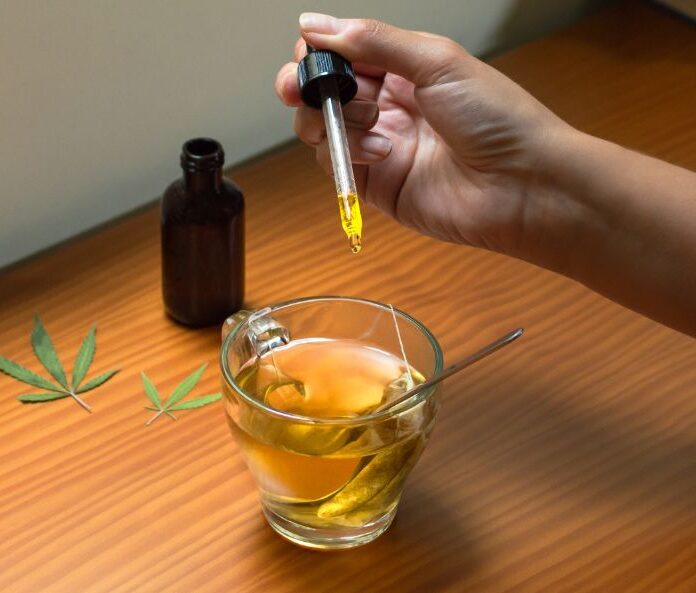CBD, or cannabidiol, is a compound found in the cannabis plant. It has gained attention for its potential therapeutic benefits, including its potential role in cancer treatment. While more research is needed, some studies suggest that CBD may have anti-tumour effects and could potentially inhibit the growth of cancer cells. Additionally, CBD may help alleviate symptoms commonly associated with cancer and its treatment, such as pain, nausea, and inflammation.
However, it is important to note that CBD should not be used as a substitute for conventional cancer treatments. It is crucial to discuss CBD use with a doctor before incorporating it into a cancer treatment plan. This is because CBD can interact with certain medications and may have different effects on different individuals. A doctor can provide personalised advice and help determine if CBD is safe and appropriate for a particular patient based on their specific condition and treatment plan.
Furthermore, discussing CBD use with a doctor is important for monitoring potential side effects and ensuring that it does not interfere with the effectiveness of other cancer treatments. Healthcare professionals have the knowledge and expertise to guide patients in making informed decisions about CBD use and can provide guidance on proper dosing and potential drug interactions.
A doctor can provide personalised advice, monitor for potential side effects, and ensure that CBD does not interfere with other cancer treatments.
Cannabinoids and Cancer Treatment
Numerous studies have provided evidence of cannabinoid’s ability to reduce tumour growth in animal models, indicating their potential as a therapeutic option for cancer patients. One particular cannabinoid, CBD, has shown promise in enhancing the potency of certain cancer drugs, suggesting a possible synergistic effect.
In a study conducted on pancreatic cancer, researchers explored the effects of cannabinoids on tumour growth. The findings revealed that CBD exhibited anti-tumour properties and demonstrated potential therapeutic benefits for pancreatic cancer patients. Further research is needed to fully understand the mechanisms behind CBD’s action and its potential in improving treatment outcomes for this aggressive form of cancer.
Another area of interest is the impact of CBD on glioblastoma cells, a type of brain cancer. Studies have shown that CBD can affect the sensitivity of glioblastoma cells to radiation, potentially enhancing the effectiveness of radiation therapy. This suggests that CBD could play a role in improving treatment outcomes for patients with glioblastoma.
Interestingly, there is evidence suggesting a potential inverse association between cannabis use and bladder cancer risk. A study found that individuals who reported cannabis use had a lower risk of developing bladder cancer compared to non-users. While more research is needed to establish a causal relationship, these findings suggest a possible protective effect of cannabis, including CBD, against bladder cancer.
It is important to note that while these studies provide promising results, further research is still needed to fully understand the potential of CBD in cancer treatment. Additionally, it is crucial to consult with healthcare professionals before incorporating CBD into a cancer treatment plan. Despite the potential benefits, CBD should not be considered a substitute for conventional cancer therapies.
The research on CBD and cancer is growing, and there is evidence to suggest its potential as a therapeutic option. However, more studies are needed to fully understand its mechanisms of action and determine its effectiveness in different types of cancer. As the scientific community continues to explore the potential of CBD, it is crucial to approach its use in cancer treatment with caution and in consultation with healthcare professionals.
Cannabinoids as Complementary Treatment
Cancer patients undergoing various cancer treatments often experience debilitating symptoms such as neuropathic pain, nausea, and loss of appetite. However, recent research has shown promising results regarding the benefits of cannabinoids, particularly CBD, in alleviating these cancer-related symptoms.
One of the most significant benefits of cannabinoids is their role in easing neuropathic pain experienced by cancer patients. Neuropathic pain is a complex condition caused by damage to the nerves, commonly resulting from cancer treatments such as chemotherapy or radiation therapy. CBD has been found to interact with the endocannabinoid system in our bodies, which plays a crucial role in regulating pain. Studies have shown that CBD can effectively reduce neuropathic pain, providing much-needed relief for cancer patients.
In addition to cancer pain management, CBD has also demonstrated its effectiveness in alleviating chemotherapy-induced nausea. Nausea and vomiting are common side effects of cancer treatments, often leading to a decreased quality of life for patients. CBD interacts with serotonin receptors in the brain, which are involved in regulating nausea and vomiting. Its antiemetic properties have been proven to reduce nausea and vomiting, allowing cancer patients to tolerate necessary treatments more effectively.
Another significant benefit of CBD is its potential to improve appetite in cancer patients. Cancer-related anorexia and cachexia are conditions characterised by a loss of appetite and severe weight loss. These conditions can be particularly challenging for patients, as they further weaken their bodies and hinder recovery. CBD has shown promise in stimulating appetite and promoting weight gain in cancer patients. By interacting with CB1 receptors in the brain, CBD can increase appetite and reduce the feeling of fullness, ultimately improving nutritional intake and overall well-being.
Moreover, CBD possesses anti-inflammatory and anti-anxiety properties, which can be highly beneficial for cancer patients. Inflammation often accompanies cancer and its treatments, leading to pain, swelling, and discomfort. CBD’s anti-inflammatory properties can help reduce inflammation, treating cancer pain for patients. Additionally, cancer patients often experience anxiety and psychological distress due to the uncertainties and challenges associated with their diagnosis and treatment. CBD has been found to have anxiolytic effects, helping to reduce anxiety levels and promote a sense of calm and relaxation.
The use of cannabinoids, particularly CBD, has shown promising results in alleviating various cancer-related symptoms. From easing cancer related pain and reducing nausea to improving appetite and providing anti-inflammatory and anti-anxiety effects, CBD offers a potential solution for cancer patients seeking relief from the side effects of cancer treatments. However, further research and clinical trials are necessary to fully understand the mechanisms and optimal dosages for utilising cannabinoids in cancer care.
Cannabinoids as Cancer Preventive
As the search for effective cancer prevention methods continues, researchers have shown increased interest in cannabinoids, particularly CBD oil. Let’s delve into the current understanding of cannabinoids, specifically CBD, as a potential cancer-preventive agent. However, it is important to note that the research in this area is still in its early stages, and more comprehensive long-term studies are required to draw concrete conclusions about CBD to treat cancer.
Mixed Results from Studies on the Role of Cannabinoids in Cancer Development:
Numerous studies have investigated the impact of cannabinoids on cancer development, yielding mixed results. While some studies suggest that certain cannabinoids may inhibit cancer cell growth and promote cell death in various types of cancer, others have not found a significant association. These conflicting outcomes highlight the complexity of cancer and the need for further research to better understand the underlying mechanisms.
Limited CBD Research on Cancer Prevention:
When it comes to CBD oil specifically, research on its potential in cancer prevention is still in its infancy. While CBD has gained popularity for its potential therapeutic effects in alleviating cancer symptoms such as pain and nausea, its role in preventing cancer remains uncertain. The limited number of studies conducted thus far have primarily focused on the effects of CBD on cancer cells in vitro or in animal models. Therefore, it is crucial to conduct long-term human studies to comprehensively assess the potential preventive properties of CBD oil.
Importance of Long-Term Studies:
Long-term studies are imperative to understand the true impact of CBD oil in cancer prevention. They would involve monitoring individuals who regularly use CBD oil over an extended period, comparing their cancer incidence rates with those who do not use CBD. Additionally, assessing potential interactions between CBD and conventional cancer treatments is crucial to ensure patient safety and optimise therapeutic outcomes.
While preliminary studies suggest that cannabinoids, including CBD oil, hold promise in preventing cancer development, more extensive research is necessary to establish concrete conclusions. As of now, the focus of CBD oil remains primarily on its potential therapeutic effects for alleviating cancer symptoms. Individuals with cancer should consult with their healthcare providers before considering CBD oil as a preventive measure, emphasising the importance of evidence-based approaches and a comprehensive cancer prevention plan.
Choosing CBD Products for Cancer-related Issues
When it comes to choosing CBD products for cancer-related issues, there are a few important factors to consider. In this section, we will discuss the variation in quality and accuracy of CBD products, the consideration of interactions between CBD and other cancer therapy options, recommendations for purchasing hemp-derived CBD products with trace amounts of THC, and the importance of buying high-quality CBD products from reputable companies with transparent sourcing and testing.
Variation in quality and accuracy of CBD products:
It is crucial to understand that not all CBD products are created equal. There is significant variation in the quality and accuracy of CBD products available in the market. This is why it is essential to choose a reputable company like The CBD Flower Shop that ensures their products are safe, effective, and legal. We work with reputable manufacturers who use premium-grade CBD extract derived from industrial hemp. This ensures that the products are very low in THC and do not have any psychoactive effects.
Consideration of interactions between CBD and other cancer therapies:
When using CBD for cancer-related issues, it is important to consider any potential interactions between CBD and other cancer therapies. CBD has been found to interact with certain medications, including those used in cancer treatment. Therefore, it is crucial to consult with a healthcare professional before incorporating CBD into your cancer treatment plan. The CBD Flower Shop understands the importance of this consideration and encourages customers to seek guidance from their healthcare provider.
Recommendations for purchasing hemp-derived CBD products with trace amounts of THC:
For cancer patients, it is recommended to choose hemp-derived CBD products that contain trace amounts of THC. THC, the psychoactive component of cannabis, has been shown to have potential benefits for cancer patients, including pain relief and appetite stimulation. However, it is important to ensure that the THC levels are within legal limits and that the products are sourced from reputable companies. The CBD Flower Shop provides CBD products that meet these recommendations, ensuring that customers have access to safe and effective options.
Importance of buying high-quality CBD products from reputable companies with transparent sourcing and testing:
When it comes to using CBD for cancer-related issues, it is crucial to buy high-quality CBD products from reputable companies. The CBD Flower Shop takes pride in offering a diverse range of high-quality CBD products that cater to all customer needs. We work with reputable manufacturers who use premium-grade CBD extract derived from industrial hemp. Additionally, we ensure transparency in our sourcing and testing processes, providing customers with peace of mind regarding the quality and safety of our products.
When choosing CBD products for cancer-related issues, it is important to consider the variation in quality and accuracy of CBD products, the interactions between CBD and other cancer therapies, the recommendations for purchasing hemp-derived CBD products with trace amounts of THC, and the importance of buying high-quality CBD products from reputable companies. The CBD Flower Shop is a trustworthy option that offers a diverse range of high-quality CBD products, ensuring that customers have access to safe and effective options for their cancer-related needs.
What products do we recommend for cancer-related symptoms?
We recommend the following products for cancer-related symptoms:
- CBD Oils: Our CBD oils can be effective in managing symptoms such as pain, nausea, and loss of appetite commonly associated with cancer treatments. They offer a natural and non-intoxicating way to alleviate these symptoms.
- CBD Extracts: CBD extracts are a concentrated form of CBD and can provide more potent relief for cancer-related symptoms. They can be used in various forms, such as adding them to food or beverages, to provide targeted relief.
- CBD Gummies: CBD gummies are a convenient and discreet option for managing symptoms like anxiety and stress, which are often experienced by cancer patients. They are easy to consume and come in different strengths and flavours.


